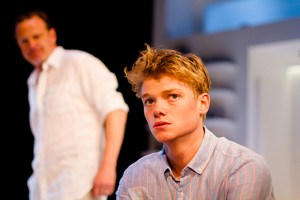Hotel (National Theatre)
Polly Stenham’s new play, directed by Maria Aberg, mixes an underlying unrest with family tensions
I once went on holiday to St Lucia in the Caribbean. I’d never go back there, or anywhere similar, because I felt so uncomfortable. A similar unease, and threat of understandable tourist terrorism, underpins Polly Stenham‘s violent slash of a new 80-minute play that is set in a pristine luxury villa on a remote Kenyan island.
In her fourth stage play – and the first not to be directed by Jeremy Herrin – Maria Aberg has done a tough, edgy job on this one – Stenham re-visits themes of a dysfunctional marriage, sibling savagery and emotional excess, stirring in new elements of colonial revenge and racialist unrest.
What she doesn’t write is the politics, and I don’t necessarily intend that as a stricture. The holiday is supposed to be a breather for middle-aged Vivienne (Hermione Gulliford) and Robert (Tom Beard) after his exposure as an internet porn purveyor has threatened their marriage and precipitated her resignation as a Secretary of State in trade and investment.
And then the holiday revelation that seventeen-year-old Ralph (Tom Rhys Harries) has been following his own father’s virtual footsteps online threatens to blow the family apart while sulky, strange 14-year old Frankie (Shannon Tarbet) demands a very different sort of "desert island experience" to what they actually get.
White middle-class Ralph and Frankie, two more of Stenham’s lost souls, are shadowed by the hotel maid Nala (Susan Wokoma) and her touchy young sidekick Abdi (Ntonga Mwanza). They perpetrate an all too familiar nightmare scenario – familiar from the newsreels, at least – of vengeful agents of the author’s guilt trip and highly developed distaste for her own privileged upbringing.
It’s a powerful element in all of Stenham’s plays to date, and she’s ringing the changes, and variations, with a gleeful and fiery intensity. Aberg’s production, and Naomi Dawson‘s clever design in what is now designated the NT’s "temporary theatre" – the rights in the name "The Shed" have reverted, apparently, to a place in Newcastle – is primed for catastrophe when the first insurrection is followed by another, more frightening, piratical incursion of four new characters.
None of these is distinctly drawn, nor is young Abdi. For plays about pirates we still fall back on Treasure Island. Wokoma’s sulphurous Nala is the voice of insurgency, while Stenham concentrates her writing on the tourists. Tom Beard looks uncannily like Colin Firth as the found-out dad, while Gulliford’s Vivienne is a convincing portrait of a blinkered career woman who regards her status as a birth right.
Her children don’t have a chance, really, and it’s fascinating to see how Stenham manipulates them into a tragic impasse in the play’s disturbing, ambiguous conclusion. And that follows one of the most viciously unpleasant outbursts of violence I’ve seen in a while, with plenty of middle-class whimpering going on among the first night audience.













